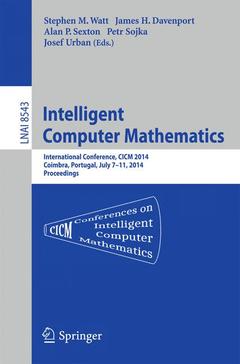Description
Intelligent Computer Mathematics, 2014
CICM 2014 Joint Events: Calculemus, DML, MKM, and Systems and Projects 2014, Coimbra, Portugal, July 7-11, 2014. Proceedings
Lecture Notes in Artificial Intelligence Series
Coordinators: Watt Stephen M., Sexton Alan, Davenport James H., Sojka Petr, Urban Josef
Language: English
Subjects for Intelligent Computer Mathematics:
460 p. · 15.5x23.5 cm · Paperback
Description
/li>Contents
/li>
Invited Talks.-What International Studies Say about the Importance and Limitations of Using Computers to Teach Mathematics in Secondary Schools.- Towards Robust Hyperlinks for Web-Based Scholarly Communication.- Computable Data, Mathematics, and Digital Libraries in Mathematica and Wolfram Alpha.- Calculemus.- Towards the Formal Reliability Analysis of Oil and Gas Pipelines.- Problem Formulation for Truth-Table Invariant Cylindrical Algebraic Decomposition by Incremental Triangular Decomposition.- A Tableaux-Based Decision Procedure for Multi-parameter Propositional Schemata.- Detecting Unknots via Equational Reasoning, I: Exploration.- Applying Machine Learning to the Problem of Choosing a Heuristic to Select the Variable Ordering for Cylindrical Algebraic Decomposition.- Hipster: Integrating Theory Exploration in a Proof Assistant.- Formalization of Complex Vectors in Higher-Order Logic.- A Mathematical Structure for Modeling Inventions.- Digital Mathematics Library.- Search Interfaces for Mathematicians.- A Data Model and Encoding for a Semantic, Multilingual Terminology of Mathematics.- PDF/A-3u as an Archival Format for Accessible Mathematics.- Which One Is Better: Presentation-Based or Content-Based Math Search?.- POS Tagging and Its Applications for Mathematics.- Mathoid: Robust, Scalable, Fast and Accessible Math Rendering for Wikipedia.- Mathematical Knowledge Management.- Set Theory or Higher Order Logic to Represent Auction Concepts in Isabelle?.- Realms: A Structure for Consolidating Knowledge about Mathematical Theories.- Matching Concepts across HOL Libraries.- Mining State-Based Models from Proof Corpora.- Querying Geometric Figures Using a Controlled Language, Ontological Graphs and Dependency Lattices.- Flexary Operators for Formalized Mathematics.- Interactive Simplifier Tracing and Debugging in Isabelle.- Towards an Interaction-based Integration of MKM Services into End-User Applications.- Towards Knowledge Management for HOL Light.- Automated Improving of Proof Legibility in the Mizar System.- A Vernacular for Coherent Logic.- An Approach to Math-Similarity Search.- Systems and Projects.- Digital Repository of Mathematical Formulae.- NNexus Reloaded.- E-books and Graphics with LATExml.- System Description: MathHub.info.- Developing Corpus-Based Translation Methods between Informal and Formal Mathematics: Project Description.- System Description: A Semantics-Aware LATEX-to-Office Converter.- Math Indexer and Searcher Web Interface: Towards Fulfillment of Mathematicians’ Information Needs.- SAT-Enhanced Mizar Proof Checking.- A Framework for Formal Reasoning about Geometrical Optics.




